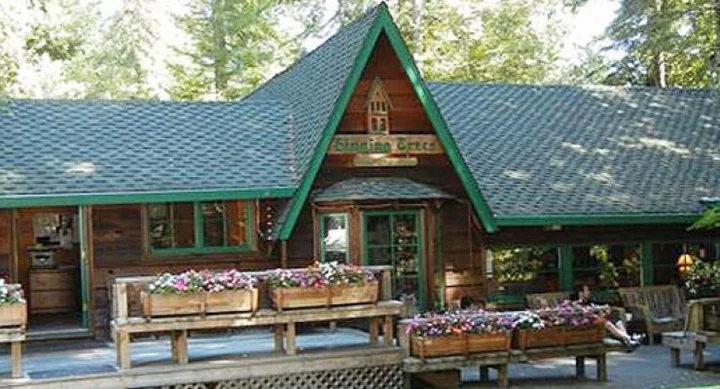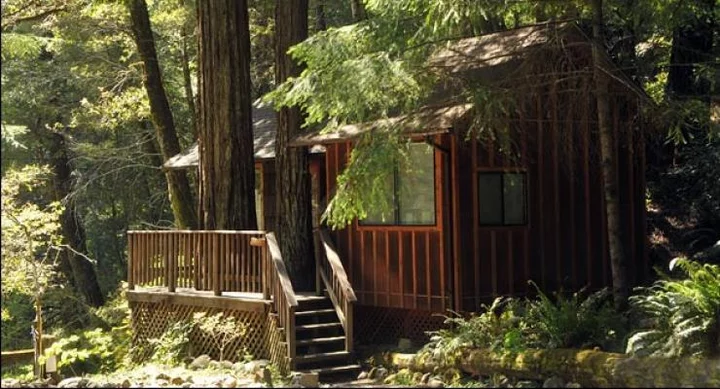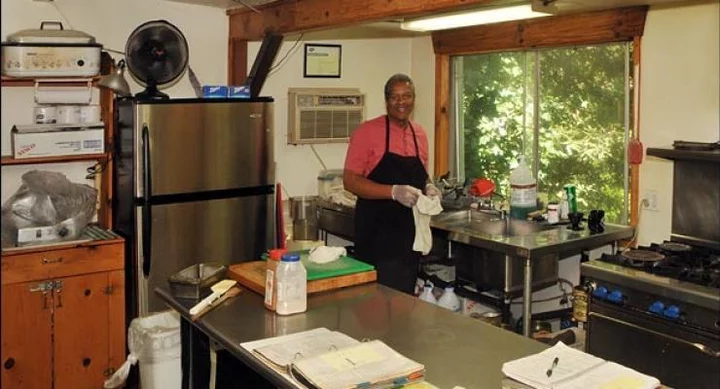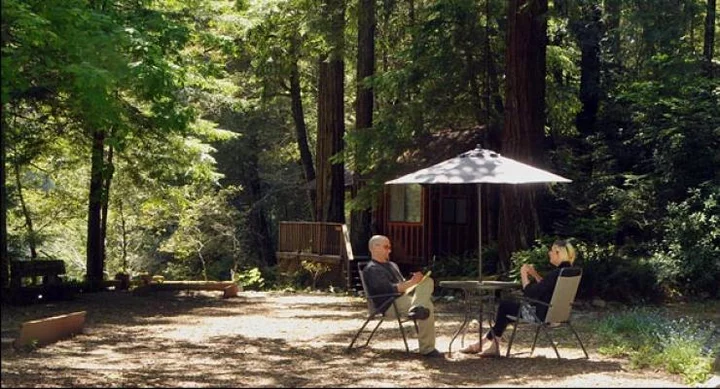The Singing Trees Recovery Center just of Highway 101, south of Garberville | Images from the Singing Trees website
###
After more than three decades of helping people struggling with addiction, Singing Trees Recovery Center – a detox and rehabilitation facility nestled in the redwoods south of Garberville – permanently closed its doors last month, and the owners are planning to sell the property that has been in the family for decades.
“I’ve been spending the last month just going through everything and getting rid of 31 years worth of stuff,” Pattie Watson, owner of Singing Trees, told the Outpost in a phone interview last week. “I feel like I’ve only made a dent. It’s good for me to just go every day to clean and clear out stuff. Most days it gives me comfort, and some days I’m just overwhelmed with grief and sadness.”
Singing Trees opened in early 1991, after Watson’s brother, Chuck Watson, and his friend decided to open a treatment center on the property owned by the Watsons’ mother. Coming out of recovery treatment herself, Patti joined the team working in the office. Eventually she took over as co-owner with her brother. About six years ago her brother moved and Patti took over as the primary facility operator.
Located on 7.5 acres of redwood forest along the Eel River, Singing Trees was known for its beautiful location that provided a calming setting for detox and recovery. The center served people not just in Humboldt County, but also from all over Northern California. From supervised detox, to two-week, 30-day, 60-day and 90-day rehabilitation programs, Singing Trees offered a variety of different treatments for people who wanted/needed help with their addiction. The center held 20 beds and usually had a staff of three counselors, who would guide 12-step meetings, group counseling and one-on-one counseling sessions.
One of Singing Trees cabins
The center also had a big kitchen, a recreation room with ping pong tables and a sweat lodge. Sessions in the sweat lodge were one of several holistic approaches to recovery used at Singing Trees, with residents also offered art therapy sessions and yoga classes. Nature also played a big role in recovery at Singing Trees, with residents – and their visitors – encouraged to sit under the redwoods, hike through the property and swim in the majestic Eel River.
“Family counseling sessions were on the weekends, and families would come and they would bring the kids and the dogs and they would go down to the river and spend the afternoon together,” Watson said. “It really was wonderful.”
Thursdays through Sundays the center also held meetings of Alcoholics Anonymous (AA) and Narcotics Anonymous (NA) that were open to the public and not just the residents. Many 12-steppers of SoHum will remember the popular Sunday lunch meeting that was held at noon, followed by a big free meal at 1 p.m. “We did that for 28 years,” Watson said. “Then when COVID hit, we had to stop that and then we never resumed it again.”
It’s no surprise that COVID changed a lot of things at Singing Trees, and it was difficult for the facility to recover from the impacts. In addition to canceling the lunch meetings (and group meetings altogether for a while), the center had to temporarily cut their residency in half, housing only 10 clients at a time. With the residents unable to gather in the kitchen or other common spaces during COVID, meals also needed to be delivered to the rooms. With no group meetings, counselors could only offer individual therapy sessions. It was a difficult time for the guests and the staff, Watson said.
Since COVID, it has been difficult for Singing Trees to keep on enough staff to operate, and that, Watson said, is the primary reason the center had to close. Keeping staff was always somewhat difficult, Watson said, because of the rural location. There is limited housing available in the Garberville/ Piercy area, and some staff members lived in Eureka and commuted the roughly 75 miles to the center. This usually resulted in people trying to find a job closer to where they live. It can also just be difficult in general to find qualified, certified staff in the field of substance use disorder.
On top of the staffing issue, the buildings were aging and upkeep of the facility was becoming more and more difficult and expensive, Watson said. There was nearly always some maintenance work that had to be done, and the rural location also meant labor and materials were costly and sometimes hard to find – another issue that was compounded by COVID.
Above: the recreation room. Below: a staffer in the kitchen.
“It just got to be too much,” Watson said. With all the issues piling up, Watson and her family decided that it was time to close Singing Trees.
Once the decision was made, the center stopped accepting new clients, but the people who were already at Singing Trees were allowed to finish their treatment. The last three residents left Singing Trees on Oct. 13. Two weeks before the closure, all of the remaining staff was informed and the residents were told one week after that.
“It was the hardest thing I’ve ever had to do — tell them that we were closing down,” Watson told the Outpost. “We’re still getting calls every day from people interested in treatment, or wanting information. [The closure] certainly wasn’t for any lack of business, because the phone was still ringing off the hook.”
Watson and the staff have been referring people to the other recovery centers — Waterfront Recovery, Humboldt Recovery Center, or Crossroads, which are all located in Eureka. Though there are other options for 12-Step meetings in SoHum, there are no other recovery/rehab centers in the area.
And other facilities are feeling the increased pressure that came with Singing Trees closure. Jeremy Campbell, executive director of Waterfront Recovery, said that they have seen a definite increase in calls in the last month and they are “doing their best” to accommodate everyone. But it is difficult, Campbell said, adding that Waterfront also has struggled to keep fully staffed, especially since COVID.
“The loss of Singing Trees is a huge loss to the community,” Campbell told the Outpost over the phone last week. “The access to recovery services is so limited as it is, especially with the need we have here locally. I know they served a lot of people in SoHum, and any loss we see for treatment for people with substance use disorder is a huge loss for the community.”
After closing the center, Watson and her family discussed some different options for what to do with the property. Some people expressed interest in leasing it, Watson said, but the family did not want to keep paying for upkeep, so the family decided that selling the land would be the best option. Watson said the family wanted to make sure the redwoods were preserved, so she contacted the Save the Redwoods League, but didn’t hear back. A family member who is a realtor is helping list the property.
Although closing Singing Trees was difficult, Watson, who recently turned 70, said she is looking forward to retirement. She plans to live out her days on her Piercy property – 40 acres that she shares with her two sons – and focus on her family and her garden.
“I just want to thank the community for all their support over the last 31 years,” Watson told the Outpost. “It’s been an absolute joy to work there. Well over 3,000 people have gone through Singing Trees and there were lots of successes. It’s just hard to imagine that we’re not going to be there anymore.”





CLICK TO MANAGE